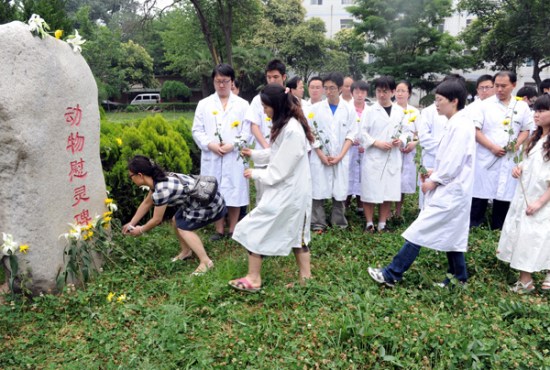
Students at Xi'an Jiaotong University's Health Sciences Center leave flowers at a monument for lab animals. (Photo/China Daily)
In a bid to gain greater global recognition and improve the accuracy of results, laboratories in China have started to adopt Western standards for the treatment and welfare of animals used in scientific tests.
Even though he spent seven years training at vet school, Zhou Quan still faced a steep learning curve when he started his professional career. The problem wasn't a lack of clinic knowledge or technical proficiency, but the treatment of animals used in laboratory tests, and the respect, or lack of it, shown to them.
"The rule is that animals are capable of feelings, just like human beings. If you wouldn't want to be treated a certain way, then neither would they," said the 29-year-old, who works for Guangzhou General Pharmaceutical Research Institute Co.
Zhou oversees conditions for nearly 300 lab animals at the institute, including 100-plus rabbits, 20 to 40 dogs, and a large number of monkeys and mice.
It didn't take him long to absorb the principles of a system called the "Three R's"-reducing the number of animals used in tests, replacing them if possible, and refining the test procedures to make them less harmful-but it prompted Zhou to reflect on the training he had received at college.
"The system just seemed so reasonable because it lowers the cost of conducting experiments and also yields results that are more widely accepted in global scientific circles," he said. "The question I kept asking myself was: Why didn't we apply these methods before?" he said.
Despite being the world's largest breeder and user of lab animals, China has no laws to protect the ones used in clinical research. The situation is set to change, though, because a rising number of international academic exchanges and the growing need for global recognition of results are prompting Chinese laboratories to adopt the three R's in the treatment of their lab animals.
Humane treatment
To date, 56 "animal care and use" programs in China have been accredited by the Association for Assessment and Accreditation of Laboratory Animal Care International, a private, nonprofit organization that promotes the humane treatment of animals in science through accreditation programs.
"I think it indicates that China wants to be on the global stage for biomedical research. It tells the world that we are taking good care of the animals we use in our research, not just with domestic standards but global standards," Kathryn Bayne, the association's global director, told China Daily at a seminar in Beijing on the ethical dimension and treatment of lab animals in March.
Sun Deming, director of the Department of Laboratory Animal Science at the National Research Institute for Health and Family Planning, said the country is planning to unveil a draft national standard on the humane treatment of animals by the end of the year.
"It will integrate the experiences of other countries in the management of lab animals, and will also include the latest concepts on the protection of animals used for research purposes," he said.
Data released by the Chinese Association for Laboratory Animal Sciences show that more than 20 million animals-including mice, rabbits, guinea pigs, dogs and monkeys-are used in research each year.
"It (better treatment) is an obligation that has to be met by the world's largest breeder and user of lab animals," Sun said.
Bayne said the need for global academic exchanges has spurred many Chinese labs to apply international standards to the treatment of animals.
"Universities and professors are now collaborating internationally. Certainly, pharmaceutical companies have a domestic market, but they also have international markets, so they need to show that they are doing work of the same quality and under the same conditions as the rest of the world," she said.
Cheng Shujun, director of the Toxicology Department at the Technology Center of the Guangdong Entry-Exit Inspection and Quarantine Bureau, said that applying the three R's would help to yield better test results.
"Results from labs that apply the three R's will garner greater international recognition. That's a major motivation for laboratories to gain global accreditation for the humane treatment of lab animals," he said. "Also, if the animals are kept in good physical and mental health, the results will be more accurate," he added.
The China Food and Drug Administration's 2013 decision to remove the mandatory requirements for animal testing on some domestically manufactured cosmetics has won plaudits from both animal rights groups and cosmetics producers.
















































